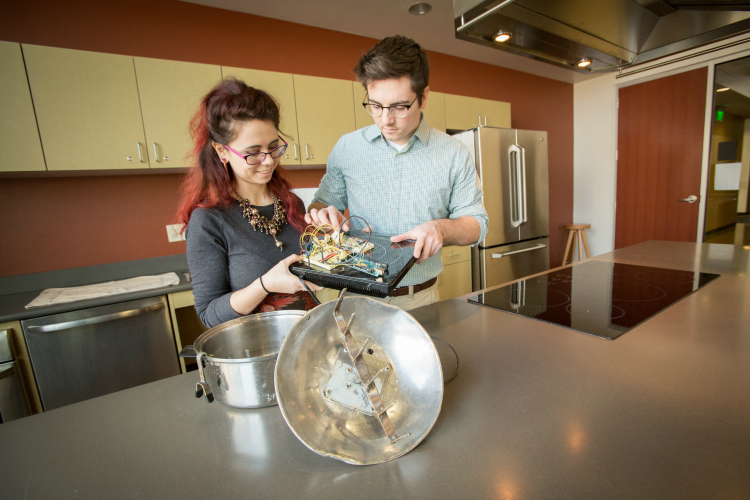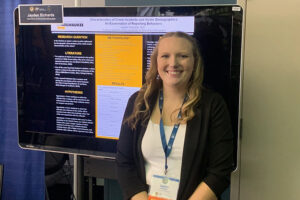When Rebecca Yoshikane and Wyatt Tinder approached the 2015-16 UWM Student Startup Challenge, they had a problem: too many ideas.
The annual challenge accepts proposals from students and recent alumni in the categories of social entrepreneurship, hardware, and software and apps. Winners selected by a panel of judges get the opportunity to develop their idea for 12 months with funding and business mentorship from local entrepreneurs and business leaders. The 2016-17 edition of the challenge kicks off in August.
Yoshikane and Tinder were encouraged to team up on a project by Nathaniel Stern, a Peck School of the Arts associate professor who co-founded the challenge. So, after a two-hour brainstorming session, they whittled their options down to five workable ideas, including collapsible worktables and windowsill herb gardens for urban apartment dwellers. But it was their Wisconsin-centric idea that ultimately became one of the challenge’s nine winners.
An automated cheesemaker.
It was a perfect compromise for the duo, born of Yoshikane’s past experience making cheese and Tinder’s interest in the project’s engineering challenge, especially regarding temperature regulation. They made their prototype from scratch, using a regular kitchen pot, a reverse-engineered induction cooktop, a circuit board and a few specially made parts. That includes cheese-cutting teeth welded to the lid.
Still in its beginning stages, the machine is in a couple of pieces connected by wires. It allows aspiring cheesemakers to craft a batch of mozzarella without the regular labor-intensive process – diligent stirring, a constant focus on temperature and time, all while leaning over a stinky pot of cheese-fixings.
“It’s not like baking bread,” Yoshikane said.
For Yoshikane and Tinder, their project was much less about creating a business and more about the creation itself. “It was about the experience of working with all the people,” Yoshikane said, “and all the knowledge they got out of it.”
Yoshikane and Tinder both graduated in May with Bachelor of Fine Arts degrees. They enjoyed partnering with students across the university, including a team of engineering students who helped produce the components that, when assembled, created their prototype.
“We bring a lot of questions to each other’s ideas,” Tinder said. “Everyone brings something to the table.”
In some cases, their knowledge overlapped. Once during a group meeting, Yoshikane brought up microcontrollers, specifically with regard to the little computer that runs everything in the machine. One of the engineers was surprised to discover her depth of knowledge about them.
“The fact that I knew how it worked, he was able to talk to me like I was an engineering student,” said Yoshikane, who learned about microcontrollers in a physical computing class at Peck.
Yoshikane and Tinder want the details of their project to be open-source. Both are connected to the maker and DIY communities, and they hope their work earns further improvement and collaboration.
“We might not be necessarily moving forward with our business or starting a business,” Tinder said, “but we still got so much out of the program that we are taking with us moving forward.”







